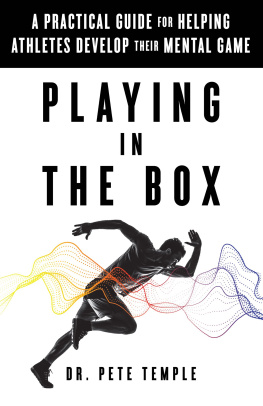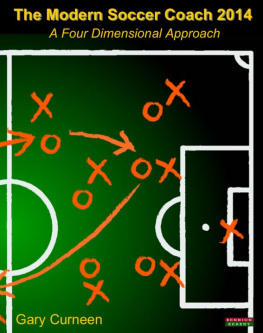Coaching the Mental Game
Acclaim for H. A. Dorfman
[Harvey] challenged us and tested us and pushed us to learn and grow.
Steve Marx, Chairman
The Center for Sales Strategy
[He has] the nuances of wisdom, strength and compassion...
Ray Karesky, President
Merex Corporation
We couldnt have been more pleased with Harveys presentation on the subject of reluctance and procrastination [and] how they affect a salespersonand ways to avoid them.
Tony Humphrey, CLU
The Prudential Insurance Agency
I invited Harvey to give a talk to the pharmacy faculty and students at St. Johns.... What he says makes sense in any environment. Needless to say, he was a big hit. Everyone at the lecture came to me to say how impressed they were with what he had to say.
Sanford Bolton, Ph.D.
College of Pharmacy & Health Professions, St. Johns University
I am among the many fortunate executives, coaches and athletes in the professional sports to have been exposed to Harvey Dorfmans leadership philosophies and performance strategies. Now readers will be able to share this good fortune.
Ken Lehner, Senior Marketing Director
Tampa Bay Lightning Hockey Team
An imprint of Globe Pequot
Trade Division of The Rowman & Littlefield Publishing Group, Inc.
4501 Forbes Boulevard, Suite 200, Lanham, Maryland 20706
Distributed by NATIONAL BOOK NETWORK
800-462-6420
Copyright 2003 by H. A. Dorfman
First Lyons Press paperback edition 2017
All rights reserved. No part of this book may be reproduced in any form or by any electronic or mechanical means, including information storage and retrieval systems, without written permission.
The hardback edition of this book was previously cataloged by the Library of Congress as follows:
Dorfman, H. A. (Harvey A.), 1935
Coaching the mental game : leadership philosophies and strategies for peak performance in sports, and everyday life / H. A. Dorfman.1st ed.
p.cm.
1. Coaching (Athletics)Psychological aspects. 2. Leadership. I. Title.
GV711 .D67 2003
796.077019dc21
2003002022
ISBN 978-1-63076-188-2 (paperback)
ISBN 978-1-63076-189-9 (e-book)
 The paper used in this publication meets the minimum requirements of American National Standard for Information SciencesPermanence of Paper for Printed Library Materials, ANSI/NISO Z39.48-1992.
The paper used in this publication meets the minimum requirements of American National Standard for Information SciencesPermanence of Paper for Printed Library Materials, ANSI/NISO Z39.48-1992.
Manufactured in the United States of America.
Dedicated with love and respect to A. Huntley Parker Jr.
My Personal MVC: Most Valuable Coach.
Born: March 18, 1910
Died: February 10, 2003
I firmly believe that sports are a fundamental part of education. To know of what one is capable, both mentally and physically, is to know the scope of ones freedom.
L. Pearce Williams
From football program:
Cornell vs. Rutgers, 1971
Psychologically, the athlete reaffirms the necessity of play.... We knew it from the scriptures and Plato and the Renaissance educators who gave athletes an equal share of the curriculum with the classics and ethics.
Dr. George Sheehan
New York Times, November 10, 1974
I always stress condition with my basketball players. I dont mean physical condition only. You cannot attain and maintain physical condition unless you are morally and mentally conditioned.
John Wooden
UCLA Basketball Coach
My favorite coach was Michael Summeymy eighth-grade AAU coach. He was the first coach who made me believe in myself and love the game of basketball.
Robert Lodge
Millbrook H.S. (NC) Athlete
Class of 2002
Last season in New England... [Patriots coach Bill] Belichick started listening to the needs of his players.
Thomas George
New York Times, September 15, 2002
Some of the material in this book previously appeared in:
The Mental Game of Baseball
The Mental ABCs of Pitching
The Mental Keys to Hitting
Pro Magazine
(Published by Street & Smith)
Foreword
In Appreciation of Harvey Dorfman By Rick Wolff
When Harvey Dorfman passed away in 2011 at the age of 75, major league baseball lost one of its all-time greats.
Over the last 30 years, just about every major league player, general manager, field manager, and agent either knew Harvey or certainly had heard of his impact. They all knew of the mental magic he worked on talented ballplayers.
Harvey was indeed a singular individual, certainly one of a kind.
So... who was Harvey Dorfman?
In short, he introduced the world of major league baseball to the wonders of sports psychology. And he did it in a most unique and unusual way.
You know the old Yogi Berra expression that half of this game is 90 percent mental? I dont know if Dorfman ever met Yogi, but trust me on this: Harvey certainly agreed with Yogi. Baseball, which is a game based upon constant failure and daily disappointment, is pockmarked by all sorts of mental distractions, obsessions, anxieties, and even superstitions. Harvey knew all of this, inhaled it all, and helped pro players of all stripes come to terms with their fears.
A man of apparent contradictions, Harvey was a most educated and literate gentleman. He was a man of letters, a true scholar. Yet to better communicate with ballplayers, he could swear like a drunken sailor with enough profanity mixed in to peel paint off a wall. Harvey offered no apology for this approach; he just knew that ballplayers would feel more comfortable with him if he spoke the language of dugouts.
But Harvey was indeed a lifelong lover of books. When I first met him and his lovely wife, Anita, at their home in Prescott, Arizona, an entire side of their living room wall was stacked from floor to ceiling with books and more books. Originally trained as a high school English teacher, Dorfman consumed the New York Times Book Review each week in much the same way he would go over the daily baseball box scores.
Back in the 1970s Harvey, Anita, and their two kids resided in Vermont, where Dorfman taught in a small private school and wrote newspaper columns. He was very proud that he coached the schools girls basketball team to great success. But during the summer months Dorfman would attend Vermont Expos minor league games, and it was there that he befriended Karl Kuehl, who oversaw the Expos minor league system.
Over the course of that summer, Kuehl became so impressed with Dorfmans approach to baseball that when Kuehl left the Expos to join the Oakland Athletics, he made sure to hire Harvey as a kind of mental skills coach.
This was a totally new concept. Understand that this was unprecedented in organized baseball. For example, when I was playing in the Detroit Tigers organization in the early 1970s, after having studied psychology as an undergraduate at Harvard, the prevailing attitude in pro baseball was that any player who needs to talk to a shrink needs to have his head examined.
As such, when Dorfman was hired by Oakland, this was a monumental breakthrough for sports psychology. But in truth, Harvey was never trained as a psychologist; he was a schoolteacher and coach. He never had a doctorate in psychology.











 The paper used in this publication meets the minimum requirements of American National Standard for Information SciencesPermanence of Paper for Printed Library Materials, ANSI/NISO Z39.48-1992.
The paper used in this publication meets the minimum requirements of American National Standard for Information SciencesPermanence of Paper for Printed Library Materials, ANSI/NISO Z39.48-1992.